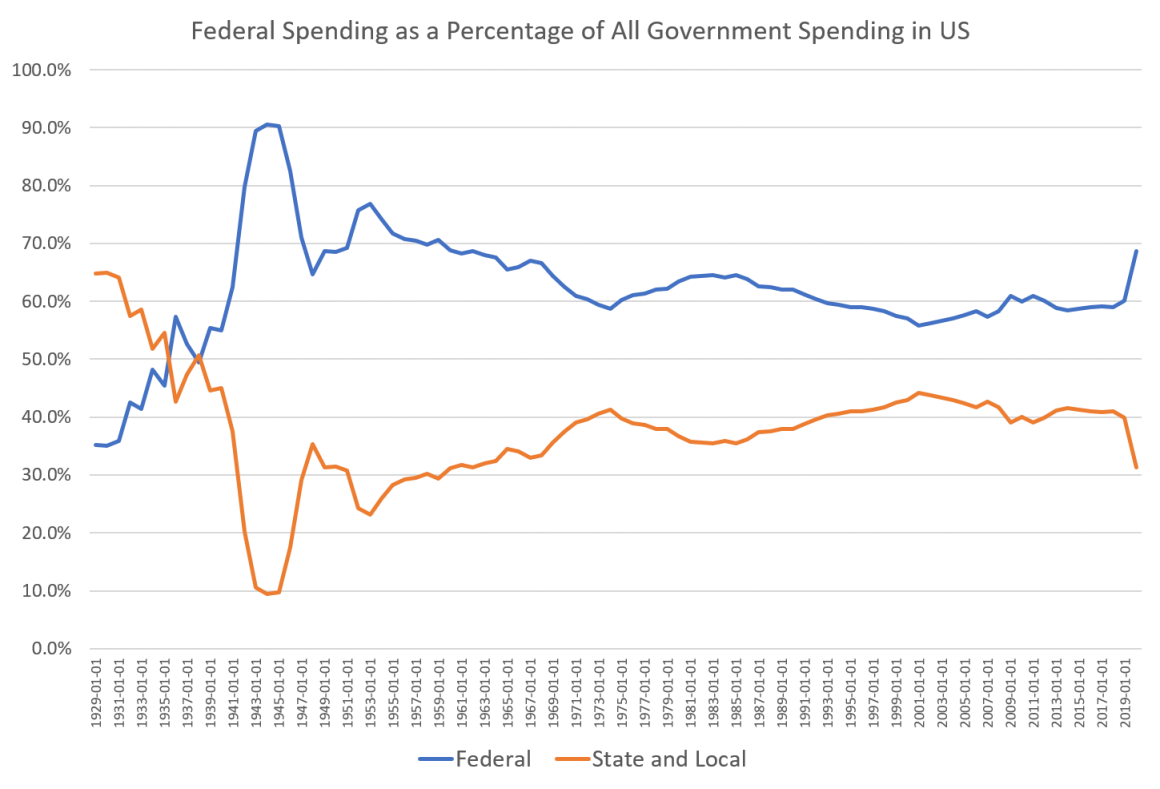With the recent rise in inflation—with subsequent increases in both consumer and producer price levels—one suspects that sooner or later people on the left either would downplay it or find a way to spin the bad news into something positive like an alchemist would want to spin straw into gold. Both accounts have arrived, thanks to the New York Times and the hard-left publication, The Intercept. The various accounts in the Times hardly are surprising, given the link the paper has to the nation’s political, economic, and academic elites, and given that these are the people that have created the inflation problem in the first place. Not surprisingly, the NYT “experts” (because progressives believe that the “experts” always have the right answers) are playing down the
Topics:
William L. Anderson considers the following as important: 6b) Mises.org, Featured, newsletter
This could be interesting, too:
Nachrichten Ticker - www.finanzen.ch writes Die Performance der Kryptowährungen in KW 9: Das hat sich bei Bitcoin, Ether & Co. getan
Nachrichten Ticker - www.finanzen.ch writes Wer verbirgt sich hinter der Ethereum-Technologie?
Martin Hartmann writes Eine Analyse nach den Lehren von Milton Friedman
Marc Chandler writes March 2025 Monthly
 With the recent rise in inflation—with subsequent increases in both consumer and producer price levels—one suspects that sooner or later people on the left either would downplay it or find a way to spin the bad news into something positive like an alchemist would want to spin straw into gold. Both accounts have arrived, thanks to the New York Times and the hard-left publication, The Intercept.
With the recent rise in inflation—with subsequent increases in both consumer and producer price levels—one suspects that sooner or later people on the left either would downplay it or find a way to spin the bad news into something positive like an alchemist would want to spin straw into gold. Both accounts have arrived, thanks to the New York Times and the hard-left publication, The Intercept.
The various accounts in the Times hardly are surprising, given the link the paper has to the nation’s political, economic, and academic elites, and given that these are the people that have created the inflation problem in the first place. Not surprisingly, the NYT “experts” (because progressives believe that the “experts” always have the right answers) are playing down the latest spikes as temporary and related to current issues of supply and demand, not any unprecedented increases in the nation’s money supply.
We should not be surprised that the NYT’s resident economic “expert,” Paul Krugman, has debunked any worries of inflation and especially inflation over the long term, instead likening the current price spikes to what happened after World War II ended and the economy moved from one dedicated to total war to one producing capital and consumption goods. Likewise, President Joe Biden is touting an endorsement of his “Build Back Better” initiatives by a number of Nobel economics winners who have claimed the proposed programs included in the legislation would reduce inflation. (One should not forget that while Krugman is a Nobel recipient, his NYT columns go well beyond any economic analysis, establishing him as little more than a partisan political shill.)
There is an important point to be made here: all of these “experts” are willing to say they believe inflation is a problem for most people and the disagreement isn’t so much about the real and potential harm inflation brings, but rather the duration of the current spikes. However, there also exists among radical progressives a belief that inflation actually is a good thing because, in their minds, it transfers wealth from the rich to the poor.
The first time I saw this theme was in an article by the Marxist journalist Alexander Cockburn, who at one time had a regular column in the Wall Street Journal. Writing about the alleged “Hitler Diaries” supposedly unearthed in the early 1980s (and later exposed as forgeries), Cockburn said if one actually could mine Hitler’s thoughts, they would find that he didn’t see the hyperinflation that ravaged Germany in the 1920s as any kind of a threat, and that it actually was good for the economy. (I’m writing from memories, as I have not been able find this column in the WSJ archives.)
Cockburn has been dead for nearly a decade, but the radical publication The Intercept is taking his place when it comes to inflation. In the article “Inflation is Good for You,” we find that inflation is not a nuisance, nor does it do real economic harm. Instead, according to the author, Jon Schwarz, inflation is a good thing because it transfers wealth from creditors to debtors, and debtors fall into the so-called 99 percent. He writes:
And what’s happening is this: The inflation freakout is all about class conflict. In fact, it may be the fundamental class conflict: that between creditors and debtors, a fight that’s been going on since the foundation of the United States.
That’s because inflation is often good for most of us, but it’s terrible for the kinds of people who own corporate news outlets—or, say, founded coal firms.
Schwarz continues:
First, inflation lessens the real value of debt. In 2020, American households had around $14.5 trillion in debt from their mortgages, credit cards, student loans, and other sources. Inflation of 6.2 percent means that the real value of that $14.5 trillion is now just $13.65 trillion in last year’s dollars.
In other words, the inflation over the past year has effectively transferred $850 billion in wealth from creditors to debtors. That’s a lot of money.
Most people are a mixture of creditors (e.g., you have a bank account) and debtors (you have a mortgage and student loans). But overall, this $850 billion has generated a big check written by the tippy-top of the income scale to everyone else. And as you’d expect, the people at the tippy-top don’t like this.
Second, inflation generally accompanies economic booms, when the unemployment rate is low and workers have the market power to demand higher pay. That’s what’s happening now: As prices increased 6.2 percent over the past year, wages for regular people went up 5.8 percent. In other words, inflation barely touched their purchasing power. And with almost 300 labor strikes in the U.S. so far this year, workers are leveraging their power to demand better compensation at historic rates. So while inflation can be a significant problem for workers if they don’t get it back in higher paychecks, that seems unlikely today.
Moreover, the median American recently had about $65,000 in debt. And while inflation has reduced the real value of each dollar of wages—in other words, its worth relative to tangible things—it’s done the same to the real value of each dollar of debt. Workers who get raises will have more dollars to pay off the same dollar amount of debt.
Put these two things together—lowered values for their assets and higher wages for workers—and you can understand why the rich people who run the U.S. absolutely detest inflation.
This is what one might call a “Yes, you really did mean that” moment much like readers experienced nearly forty years ago when Cockburn praised Germany’s hyperinflation. For that matter, we can point to the recent examples of hyperinflation in Venezuela and Zimbabwe, neither of which can be reinterpreted as having provided the lower-income masses with anything but lower real incomes. (Surprisingly—or perhaps not surprisingly—Schwarz does not mention either country.)
On the surface, one might think The Intercept has a valid point. After all, inflation really does deleverage debt that is based upon fixed interest rates, and during the Germany hyperinflation, many debtors were able to dump piles of worthless money upon creditors’ desks, paying off their loans. Furthermore, if the legitimate explanation for what happens with inflation were limited to the quantity theory of money, then inflation would be a good thing for anyone owing money, since under this theory, incomes rise immediately with prices, so at worst, most people are temporarily inconvenienced by rising prices.
Picture this theory as being based upon the imaginary event of someone throwing new money from a helicopter, with each person grabbing an amount of money that increases all incomes simultaneously by the same percent. Someone who earns $20,000 a year grabs $2,000 while someone earning $200,000 grabs $20,000. Such a scenario would result in growing absolute income inequality with each new round of inflation and immediately undermines the leftist claims that inflation “helps” lower-income people, not that leftists ever would admit it. The only other scenario is that everyone catches the same amount of money, so that while everyone sees an increase in their money income, low-income people see their incomes go up by a greater percentage—if that is how inflation really works.
But it is clear inflation does not work like that, but only the Austrians have presented an accurate picture of how incomes rise during bouts of inflation, and there is no helicopter in sight. In Man, Economy, and State Murray N. Rothbard points out that inflation begins with expansion of bank credit through the fractional reserve system and the transmission mechanism determines how incomes will be gained from there. He writes:
Credit expansion has, of course, the same effect as any sort of inflation: prices tend to rise as the money supply increases. Like any inflation, it is a process of redistribution, whereby the inflators, and the part of the economy selling to them, gain at the expense of those who come last in line in the spending process. This is the charm of inflation—for the beneficiaries—and the reason why it has been so popular, particularly since modern banking processes have camouflaged its significance for those losers who are far removed from banking operations. The gains to the inflators are visible and dramatic; the losses to others hidden and unseen, but just as effective for all that. Just as half the economy are taxpayers and half tax-consumers, so half the economy are inflation-payers and the rest inflation-consumers.
He continues:
For the new monetary equilibrium will not simply be the old one multiplied in all relations and quantities by the addition to the money supply. This was an assumption that the old “quantity theory” economists made. The valuations of the individuals making temporary gains and losses will differ. Therefore, each individual will react differently to his gains and losses and alter his relative spending patterns accordingly. Moreover, the new money will form a high ratio to the existing cash balance of some and a low ratio to that of others, and the result will be a variety of changes in spending patterns. Therefore, all prices will not have increased uniformly in the new equilibrium; the purchasing power of the monetary unit has fallen, but not equi-proportionally over the entire array of exchange-values. Since some prices have risen more than others, therefore, some people will be permanent gainers, and some permanent losers, from the inflation.
Particularly hard hit by an inflation, of course, are the relatively “fixed” income groups, who end their losses only after a long period or not at all. Pensioners and annuitants who have contracted for a fixed money income are examples of permanent as well as short-run losers. Life insurance benefits are permanently slashed. Conservative anti-inflationists’ complaints about “the widows and orphans” have often been ridiculed, but they are no laughing matter nevertheless. For it is precisely the widows and orphans who bear a main part of the brunt of inflation. Also suffering losses are creditors who have already extended their loans and find it too late to charge a purchasing-power premium on their interest rates.
As Rothbard notes, the wealth transfers occur when people first in line to receive the new injections of money are able to spend at the old prices, while those who are further back on the receiving chain will be the ones continually falling behind, as they purchase goods at their new prices. Contra Schwarz, one can be assured that lower-income people will be at the bottom of the inflation food chain.
Furthermore, as Henry Hazlitt writes in Economics in One Lesson, the wealthy-as-the-creditors-and-everyone-else-as-debtors story does not stand up to scrutiny. First, and most important, the incessant money pumping from the Federal Reserve System coupled with its suppression of interest rates has benefitted the wealthiest Americans at the expense of everyone else. Take billionaires like Jeff Bezos and Bill Gates, for example. The vast amount of the official wealth owned by these men is in Amazon and Microsoft stock, respectively, and we have seen a large increase in stock prices due to Fed policies.
Middle-class people, on the other hand, historically have increased their wealth through saving, whether it be done through bank time deposits, money market certificates, or corporate and municipal bonds, making them creditors. Fed policies have severely limited these options, driving investments into equities, and many middle-class people who are not sophisticated investors find it difficult to navigate the wild swings in stock prices that have come with inflation-driven asset bubbles. These bubbles have wildly inflated stock prices, enriching those whose income is driven by stock price increases and widening the wealth gaps in the economy.
Whatever temporary gains many workers are experiencing with higher wages, the euphoria is not likely to last long. Furthermore, one doubts that this current bout of inflation is as temporary as Paul Krugman recently claimed. The US economy more and more seems to be running on empty and this means that monetary authorities are going to pump even more new money into the system. Don’t count on this being a windfall for anyone but the wealthiest among us.
Tags: Featured,newsletter








